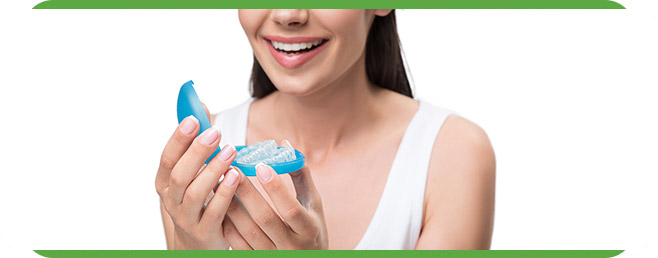Types of Oral Appliances for Sleep Apnea
We offer reliable oral appliances to help you overcome sleep apnea. Call our team today at Koala® Center For Sleep & TMJ Disorders or visit us online to book an appointment. We have convenient locations across the U.S. in Bloomington IL, Peoria/Dunlap IL, El Paso TX and Wausau WI.




Table of Contents:
What is considered an oral appliance?
Which is the most effective dental appliance for sleep apnea?
What are the advantages of oral devices?
What is a BiPAP machine?
What is the process to get a CPAP machine?
Millions of Americans suffer from sleep apnea, a disorder in which breathing repeatedly stops and starts during sleep. In severe cases, people can lose up to a night’s sleep every week due to these interruptions. Traditional treatment options for sleep apnea include continuous positive airway pressure (CPAP), which involves a machine that gently blows air into the nose and throat to keep the airway open during sleep, and oral appliances, which are fitted devices that push the jaw forward to open the airway in a similar way.
Oral appliances are used to treat sleep apnea, a condition in which breathing becomes temporarily shallow or ceases during sleep. Sleep apnea can result in excessive daytime sleepiness, and in some cases, it can lead to high blood pressure, heart disease, stroke, and even brain damage. The most common type of sleep apnea is obstructive sleep apnea, in which breathing becomes blocked or obstructed during sleep. Oral appliances are custom-fitted devices that are worn during sleep to help keep the airway open. The most common type of oral appliance used to treat sleep apnea is a mandibular advancement device (MAD), which is a mouthpiece with a flexible plastic or metal neckband that is worn at night to reposition the upper jaw forward and close the airway.
The first step in treating sleep apnea is to identify and treat the underlying tongue, jaw, and throat muscle weakness that is causing the repeated obstructions and blockages of the airways during sleep. This is typically done through an oral appliance, which is a fitted mouthpiece worn at night that keeps the soft tissue of the mouth in the right shape/position to prevent airway blockages. There are several different types of oral appliances and they are all designed to provide the best possible treatment for each individual patient’s condition. In some cases, oral appliances are all that is needed to get long-term results with no further treatment for sleep apnea.
The oral appliance that is most effective for sleep apnea varies from one person to the next and depends on several factors unique to each patient. The most common oral appliances are:
– Elastic Mandibular Advancement Appliance
– Clasp Retained Mandibular Positioner
– Elastomeric Sleep Appliance
– Tongue Stabilizing Device
– Mandibular Inclined Repositioning Appliance
– Medical, Dental Sleep Appliance
– Full Breath Appliance
– Oral Pressure Appliance
– OSAP
Oral devices for sleep apnea provide a number of benefits, including their portability, which makes them easy to take traveling; they do not require electrical energy to function, so they are more accessible and readily available, and they are quiet and comfortable and do not cause disturbances to others in the room.
The BiPAP (bilevel positive airway pressure) machine is a device used to help people breathe when they are experiencing respiratory problems during sleep. It is a type of continuous positive airway pressure (CPAP) machine, which is a device that helps keep the airways open and allows air to flow into the lungs when a person is breathing. BiPAP is used to treat breathing problems caused by obstructive sleep apnea, a condition that causes interrupted breathing during sleep. It is designed to provide extra air to the lungs when a person’s breathing is disrupted during sleep, helping to prevent pauses in breathing and reduce the symptoms of sleep apnea. Different from CPAP, BiPAP adjusts the airway pressure accordingly for inhalations and exhalations.
To get a CPAP machine, one must first receive a diagnosis for sleep apnea. This can be performed at a qualified sleep clinic, which the team at Koala® Center For Sleep & TMJ Disorders would refer you too. After a diagnosis has been formulated, treatment options will be discussed, which may include a CPAP or an oral appliance. If you are experiencing a lack of quality sleep due to sleep apnea, come to Koala® Center For Sleep & TMJ Disorders for sleep care. We serve patients from all across the United States.

Additional Services You May Need
▸ KoalaKIDZzz®
▸ Sleep Apnea
▸ Snoring
▸ TMJ Disorder
▸ Fatigue
▸ Sleep Disorders
▸ Weight Loss
▸ CPAP Alternative
▸ Oral Appliances




